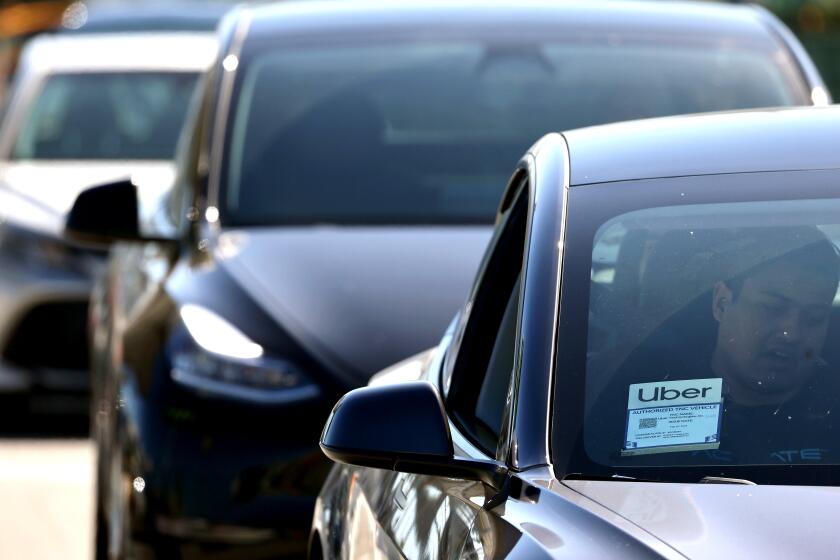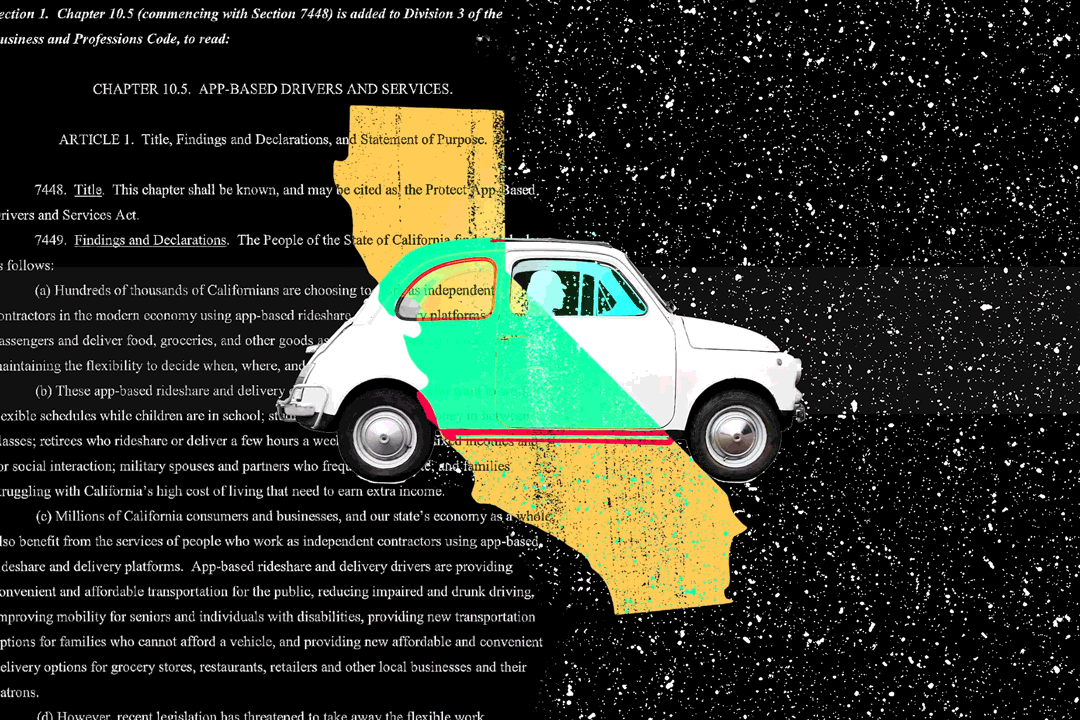California Supreme Court upholds Prop. 22, ending legal saga over status of gig drivers

- Share via
The California Supreme Court on Thursday upheld Proposition 22, the voter initiative that allows Uber, Lyft and other gig economy companies to classify drivers for their ride-hailing and delivery services as independent contractors rather than as employees.
In a unanimous decision released Thursday morning, the state’s top court rejected claims brought by a group of drivers and a major labor union that the law is unconstitutional because it interferes with lawmakers’ authority over matters dealing with workers’ compensation.
The ruling, which was expected after a lopsided hearing in the case in May, marks the end of a years-long legal fight over Proposition 22, which essentially carved out a new classification for workers who are entitled to limited benefits but not the array of rights granted full-fledged employees.
Because the law has remained in effect throughout the legal process, the decision will not change how delivery and ride-hailing services operate in California. Uber, Lyft, DoorDash and other gig companies had argued their business models depended on the law being upheld and threatened to shut down in California if it was struck down.
Gig companies that backed Proposition 22 celebrated the ruling, saying California’s law affords workers control over their schedules.
“Today marks an historic moment and a landmark victory,” Morgan Fong, general counsel for Instacart, said in a statement Thursday. “Instacart shoppers consistently and overwhelmingly tell us they value their flexibility and independence. The Court’s decision preserves access to the flexible earnings opportunities they want and the important benefits provided under Prop. 22.”
Uber spokesperson Zahid Arab said the decision “affirm[ed] the will of the nearly 10 million Californians who voted to deliver historic benefits and protections to drivers, while protecting their independence.”
The decision has sweeping implications for the 1 million-plus people who drive for app-based companies in California. Some of these workers have raised concerns over low wages, minimal workplace protections and exploitative practices they say they face. The decision also is likely to have ripple effects on drivers across the U.S., as Uber has pushed for laws similar to Proposition 22 in other states.
At the hearing in May, Scott Kronland, the attorney representing the union and drivers that brought the lawsuit challenging Proposition 22, argued that California’s Constitution has given the Legislature “unlimited” power to regulate workers’ compensation for more than a century.
Justice Goodwin H. Liu , however, appeared unpersuaded, saying at the hearing that the law doesn’t necessarily prevent workers from receiving workers’ compensation and does not block legislators from deciding that independent contractors are eligible for workers’ compensation.
Liu wrote in Thursday’s decision that the court concluded the state Legislature does not have sole authority to govern workers’ compensation since the state Constitution does not bar voters from passing initiatives on the matter.
Industry coalition backing Proposition 22 says it’s cautiously optimistic the state’s highest court will uphold the controversial gig worker law.
Uber, Lyft, DoorDash and other companies poured upward of $200 million into a campaign to sway voters in favor of Proposition 22 in 2020. It passed with 59% of the vote and went into effect soon after.
Under the law, drivers are considered to be their own employers, a designation that frees the companies they drive for from having to provide the full slate of benefits that traditional employees in the state are entitled to, such as overtime, sick leave and a minimum wage.
Labor groups denounced the decision but said there may be other avenues for gig workers to win workplace protections.
Tia Orr, executive director of Service Employees International Union California, the union that brought the legal challenge to Proposition 22, pointed out that an earlier ruling in the appeals process had validated the state Legislature’s authority to pass laws enabling rideshare drivers to join together in a union, which “gives workers a path to collectively bargain for better pay, benefits and protections.”
“While today’s California Supreme Court decision is disappointing, Uber and Lyft drivers in the state refuse to back down from their fight to win union rights and bring these companies to the bargaining table,” April Verrett, president of SEIU, said in a Thursday news release.
Lorena Gonzalez, president of the California Federation of Labor Unions, said her group “will continue to fight for all workers and work to stop wealthy corporations from abusing the initiative process to deny workers’ rights.”
Gig companies have poured a historic amount of money into defeating a law to make workers employees. What happens if their effort fails?
The Service Employees International Union and a group of drivers first brought the lawsuit challenging Proposition 22 in January 2021, just after the law went into effect. They unsuccessfully sought to take the case directly to the California Supreme Court and were left to pursue the case in a lower court.
Then, in a sweeping decision in August 2021, Alameda County Superior Court Judge Frank Roesch ruled that Proposition 22 was unconstitutional and unenforceable. The law failed to pass constitutional muster, Roesch wrote, because it infringed on the power of the Legislature, explicitly granted by the state Constitution, to regulate compensation for workers’ injuries.
“If the people wish to use their initiative power to restrict or qualify a ‘plenary’ and ‘unlimited’ power granted to the Legislature, they must first do so by initiative constitutional amendment, not by initiative statute,” the judge wrote.
In March 2023, a split three-judge panel from a state appeals court largely reversed that ruling, finding the law did not impede the Legislature’s authority and upholding the legality of the law’s provision classifying drivers as contractors.
More to Read
Inside the business of entertainment
The Wide Shot brings you news, analysis and insights on everything from streaming wars to production — and what it all means for the future.
You may occasionally receive promotional content from the Los Angeles Times.













